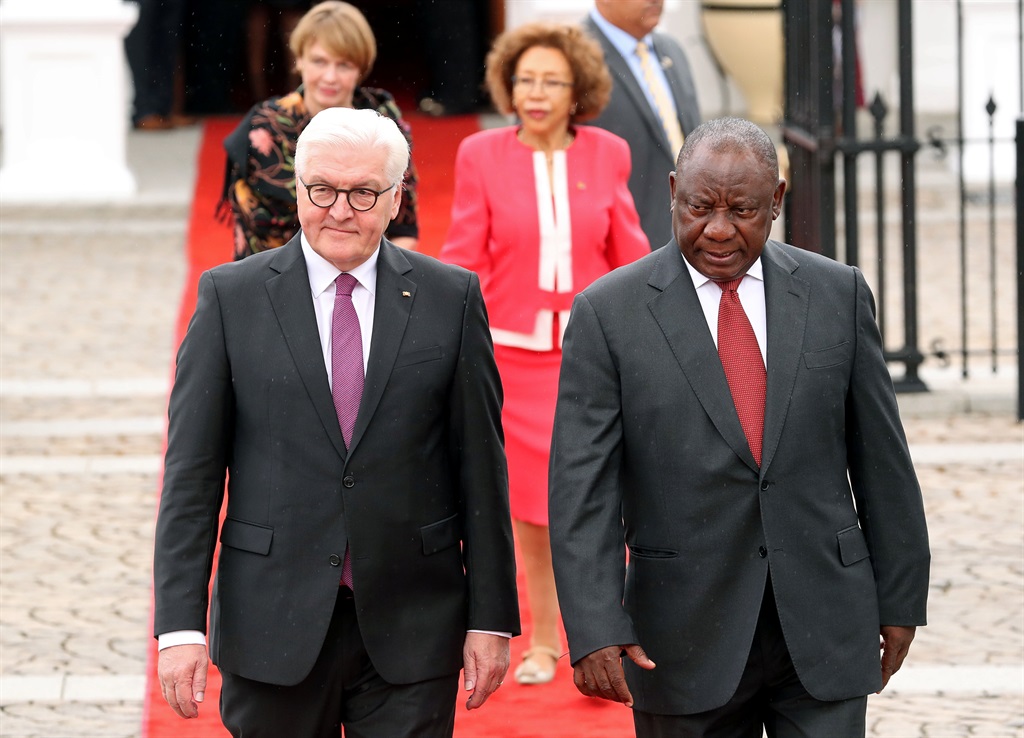
It has been 20 years since a German president has visited South Africa, and the three-day official state visit by President Frank-Walter Steinmeier and his delegation this week has seen important strides towards economic and social growth between the two nations.
On Monday, Steinmeier paid a visit to the Apartheid Museum in Johannesburg, where he delivered a striking speech on the ties between South Africa and Germany, which go as far back as the release of former president Nelson Mandela from prison, in 1990.
Just six months after Madiba’s historic release, his feet were rooted firmly on German soil during an official state visit.
Mandela was greeted by former Chancellor Willy Brandt, who told him: “Nelson Mandela, you are among friends here.”
Both Brandt and Mandela, through their efforts at restoring peace and reconciliation, were awarded the Nobel Peace Prize.
“Ladies and gentlemen, this meeting between Brandt and Mandela was preceded by various events that link our countries. Just a few weeks before Mandela’s release, the Berlin Wall fell. And it is no coincidence that only a few weeks separated these two events, on 9 November 1989 and 11 February 1990,” Steinmeier said on Monday.
The German president spoke frankly of the ties that bind the two countries. He compared the increasing anti-Semitic views, that are openly expressed in Germany, with South Africa’s xenophobic and racist attacks that gained international attention.
“We have been experiencing hatred and brutalisation – for a long time now, no longer just within the anonymity of the internet, but out on the streets. Racism, anti-Semitism and xenophobia have not been overcome in Germany either. Overcoming them remains a constant obligation for all in our society,” Steinmeier said.
So strong is the rise in anti-Semitism that, according to reports from Germany, the number of anti-Semitic crimes in Germany’s largest state, North Rhine-Westphalia, rose by 9% to 324 in 2017.
It has even necessitated the creation of the position of a state anti-Semitism commissioner to tackle the startling rise.
In schools, attacks against children of Jewish backgrounds are on the rise, with anti-bullying experts being sent in by the government in the coming school year to tackle this.
In one disturbing incident, a 15-year-old boy had smoke blown into his face by a fellow pupil, before being told: “That should remind you of your forefathers.”
What the president said on Monday was that Germany’s struggles were not solitary ones – the rise of racism, bullying, xenophobia and discrimination was a global phenomenon, and both South Africa and Germany were under immense pressure to get this rise of hate under control.
“South Africa’s reality reminds us in Germany that Europe is not the only place to which people migrate or come when they are forced to flee their homes. Your country has itself taken in a great many people, from your neighbouring countries, from all across Africa. This achievement deserves respect, appreciation and support,” Steinmeier said.
But recent rhetoric on South Africa’s immigration policy has left a bitter taste in the mouths of some critics.
Just last week at the National Education, Health and Allied Workers’ Union’s Nurses’ Summit, Health Minister Aaron Motsoaledi spoke about how undocumented immigrants in the country were throttling the country’s clinics and hospitals.
He called for South Africa to re-evaluate its immigration policy.
In Germany, following Chancellor Angela Merkel’s welcoming of almost a million immigrants into the country in 2015, in line with Germany’s “Willkommenskultur,” or culture of welcoming, political opponents attacked her viciously.
On Tuesday, Steinmeier met with President Cyril Ramaphosa in Cape Town, where they discussed the economic ties between the two countries, something which has been at the centre of Ramaphosa’s investment drive since he became president in February.
Last month, Ramaphosa attended the G20 Africa summit in Germany, where Steinmeier hosted South Africa and several other states, bringing together German companies and investors.
On Tuesday, Steinmeier spoke of the confidence that Germany had in South Africa, and highlighted the fight against corruption through the Zondo Commission, which was investigating allegations of state capture.
He said the fight against corruption was vital to Germany’s investment agenda.
“Whether in Europe or in Africa, we are living in eventful times. We are living through a period of great change. One can see this very clearly in your country. South Africa is daring to make a transformation, and for that I wish you confidence and great shared determination. For we are embarking on a future that is open. Perhaps more open than ever before. And, if we look around the world, we see a lot of proof that change can take us in extremely different directions. It can be change that consolidates that which binds us, or it can be change that widens divides,” Steinmeier said on Monday.
Germany signed off on a loan with the City of Cape Town to the value of R 1.3 billion on Tuesday, targeting “energy-efficient, ecological, economical and sustainable urban wastewater management”.
The loan, payable over 15 years at a concessional rate, will see the city able to upgrade its 25 wastewater facilities.
With this in mind, the ties that South Africa and Germany share will be one to watch closely, as Ramaphosa draws more investment into the country, while trying to suppress rising tensions.




 Publications
Publications
 Partners
Partners








